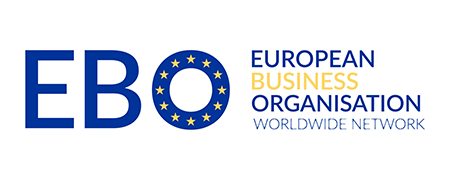On September 17, 2024, the European Business Organisation Worldwide Network (EBOWN) hosted a webinar on the Corporate Sustainability Due Diligence Directive (CS3D). The event provided a comprehensive overview of compliance strategies and the implications of the CS3D for businesses globally.
Following the European Council’s adoption of the directive in May 2024, an increased focus has emerged on how businesses can implement this transformative regulation. This webinar marked another opportunity for EBOs and their members to gain further clarity on the directive, exchange insights, and explore next steps.
The session was organised and moderated by Adam Dunnett, EBOWN Deputy Chair and Secretary-General of EBO China, and featured presentations by Dan Dionisie, Head of Unit, from the European Commission’s DG Justice and Antony Crockett, Partner at Herbert Smith Freehills.
Mr. Dionisie’s presentation provided a detailed overview of the CS3D’s objectives, implementation timeline, and scope. The directive, which came into effect in July 2024, requires member states to transpose it into national law by July 2026. The largest companies will have to comply as from July 2027, with staggered application to the other businesses within scope following in 2028 and 2029. A key focus of the CS3D is improving human rights and environmental protections throughout supply chains, mandating that companies integrate sustainability practices into their operations, assess risks, and invest as needed in their value chains. The directive also requires the development of climate transition plans aligned with net-zero goals, with annual updates. Mr. Dionisie also highlighted that enforcement will rely on administrative supervision (with penalties for non-compliance possibly including fines) and on potential civil liability in cases where non-compliance results in harm. He also noted that a new round of public consultation will begin in October 2024, allowing businesses and other stakeholders to share good practices and contribute to shaping future guidelines.
Mr. Crockett then built upon these insights, focusing on the practical steps businesses must take to comply with CS3D. He emphasised that the directive’s impact extends beyond immediate stakeholders, influencing suppliers and business partners globally. Mr. Crockett outlined three key obligations under CS3D: due diligence, transparency, and climate transition planning. Businesses are required to continuously assess, prioritise, and mitigate adverse human rights and environmental impacts, maintaining transparency in their actions and decisions. He also highlighted the importance of regular risk assessments, establishing complaint mechanisms, and clear communication of efforts to ensure compliance. He also stressed the role of collaboration, while cautioning against violating antitrust regulations. Furthermore, he discussed the potential consequences of non-compliance, which include financial penalties, exclusion from public procurement, and civil liability. He concluded by noting that due diligence under CS3D is an ongoing process, requiring businesses to integrate sustainability policies across their risk management systems to ensure compliance.
For the past two years, the EBOWN has actively focussed and reported on the CS3D developments through a series of events as well as the publication of its own CS3D position paper.
As the directive continues to shape the future of corporate sustainability , EBOWN remains committed to supporting its members through ongoing information sharing, capacity building, and collaboration, ensuring they are equipped to navigate the complexities of this regulatory landscape.
The EBOWN will also be submitting comments during the next round of public consultation, and will continue to be a key partner for the European Commission in ensuring successful rollout of the CSDDD in third markets.



